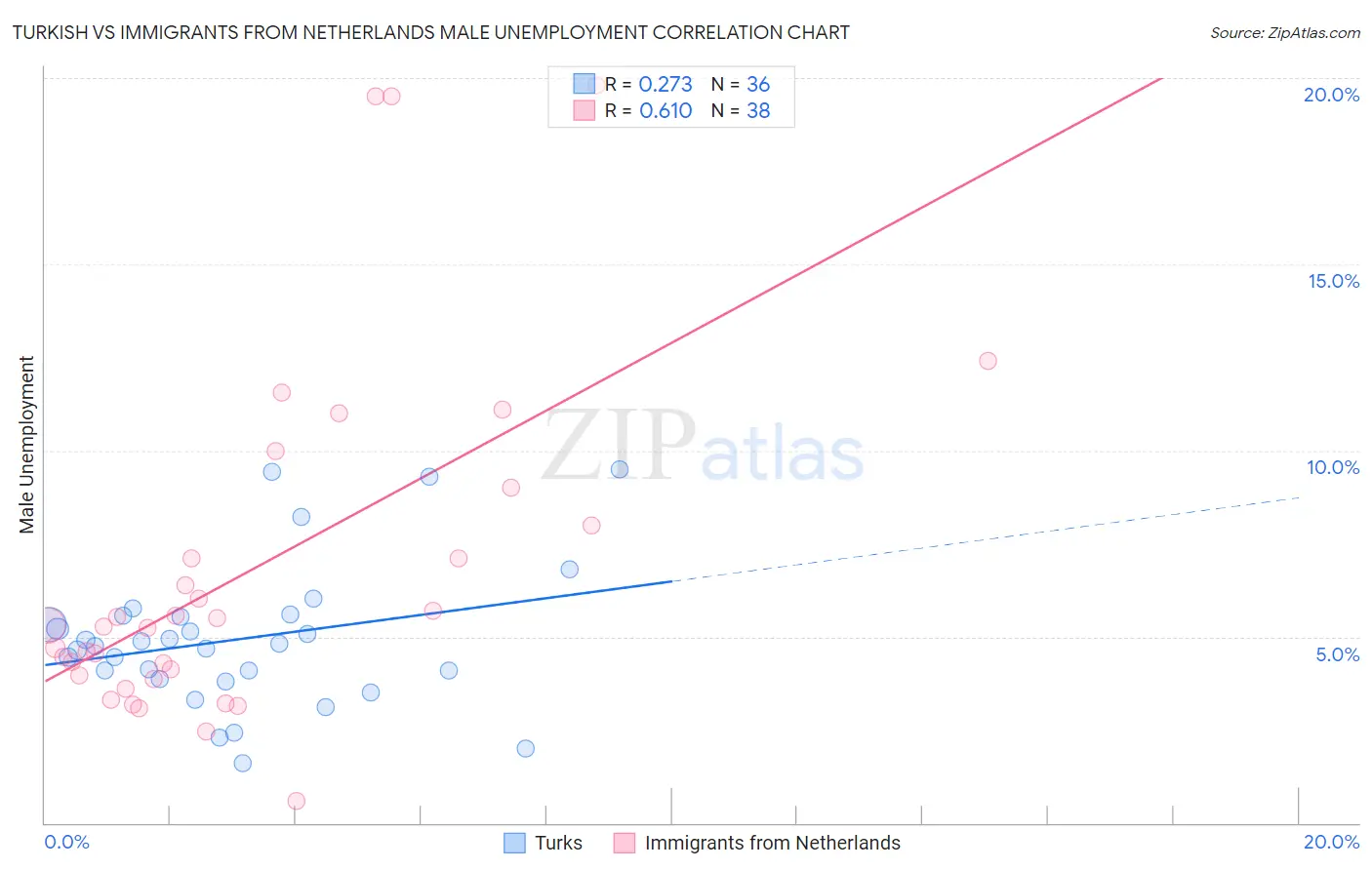Turkish vs Immigrants from Netherlands Male Unemployment
COMPARE
Turkish
Immigrants from Netherlands
Male Unemployment
Male Unemployment Comparison
Turks
Immigrants from Netherlands
5.0%
MALE UNEMPLOYMENT
98.5/ 100
METRIC RATING
57th/ 347
METRIC RANK
5.0%
MALE UNEMPLOYMENT
98.3/ 100
METRIC RATING
59th/ 347
METRIC RANK
Turkish vs Immigrants from Netherlands Male Unemployment Correlation Chart
The statistical analysis conducted on geographies consisting of 271,353,998 people shows a weak positive correlation between the proportion of Turks and unemployment rate among males in the United States with a correlation coefficient (R) of 0.273 and weighted average of 5.0%. Similarly, the statistical analysis conducted on geographies consisting of 237,368,894 people shows a significant positive correlation between the proportion of Immigrants from Netherlands and unemployment rate among males in the United States with a correlation coefficient (R) of 0.610 and weighted average of 5.0%, a difference of 0.14%.

Male Unemployment Correlation Summary
| Measurement | Turkish | Immigrants from Netherlands |
| Minimum | 1.6% | 0.60% |
| Maximum | 9.5% | 19.8% |
| Range | 7.9% | 19.2% |
| Mean | 4.9% | 6.8% |
| Median | 4.8% | 5.3% |
| Interquartile 25% (IQ1) | 4.0% | 4.0% |
| Interquartile 75% (IQ3) | 5.5% | 8.0% |
| Interquartile Range (IQR) | 1.6% | 4.0% |
| Standard Deviation (Sample) | 1.9% | 4.7% |
| Standard Deviation (Population) | 1.9% | 4.6% |
Demographics Similar to Turks and Immigrants from Netherlands by Male Unemployment
In terms of male unemployment, the demographic groups most similar to Turks are Lithuanian (5.0%, a difference of 0.0%), Immigrants from Bulgaria (5.0%, a difference of 0.23%), Yugoslavian (5.0%, a difference of 0.24%), Czechoslovakian (5.0%, a difference of 0.24%), and Immigrants from Argentina (5.0%, a difference of 0.33%). Similarly, the demographic groups most similar to Immigrants from Netherlands are Lithuanian (5.0%, a difference of 0.14%), Immigrants from Argentina (5.0%, a difference of 0.18%), Cambodian (5.0%, a difference of 0.26%), Immigrants from Bulgaria (5.0%, a difference of 0.37%), and Yugoslavian (5.0%, a difference of 0.38%).
| Demographics | Rating | Rank | Male Unemployment |
| Immigrants | Scotland | 98.9 /100 | #48 | Exceptional 4.9% |
| Poles | 98.9 /100 | #49 | Exceptional 4.9% |
| Croatians | 98.9 /100 | #50 | Exceptional 4.9% |
| Slovenes | 98.8 /100 | #51 | Exceptional 5.0% |
| Irish | 98.8 /100 | #52 | Exceptional 5.0% |
| Jordanians | 98.8 /100 | #53 | Exceptional 5.0% |
| Yugoslavians | 98.7 /100 | #54 | Exceptional 5.0% |
| Czechoslovakians | 98.7 /100 | #55 | Exceptional 5.0% |
| Immigrants | Bulgaria | 98.7 /100 | #56 | Exceptional 5.0% |
| Turks | 98.5 /100 | #57 | Exceptional 5.0% |
| Lithuanians | 98.5 /100 | #58 | Exceptional 5.0% |
| Immigrants | Netherlands | 98.3 /100 | #59 | Exceptional 5.0% |
| Immigrants | Argentina | 98.1 /100 | #60 | Exceptional 5.0% |
| Cambodians | 98.1 /100 | #61 | Exceptional 5.0% |
| Basques | 97.9 /100 | #62 | Exceptional 5.0% |
| Eastern Europeans | 97.9 /100 | #63 | Exceptional 5.0% |
| Celtics | 97.8 /100 | #64 | Exceptional 5.0% |
| Icelanders | 97.6 /100 | #65 | Exceptional 5.0% |
| Finns | 97.5 /100 | #66 | Exceptional 5.0% |
| Immigrants | Canada | 97.5 /100 | #67 | Exceptional 5.0% |
| Australians | 97.4 /100 | #68 | Exceptional 5.0% |